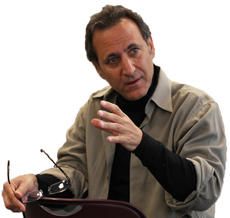Psychology
Into the Dark: A Psychology of Soul, Shadow, and Diversity
A Psychology of Soul: Redeeming Our Humanity
Posted April 21, 2014
I don’t know about you, but I can’t stand to see one more article or book saying there are “5 Keys to Success,” “7 Elements for Being Happy,” or “6 Steps to Healing.” Not that these writings are without merit, but let’s face it, they often dumb us down. Of course it’s seductive to be given The Answer, especially when it’s the answer to everything we’ve ever wanted. But at what cost? What gets left behind?
To me, these teachings seem to leave out our depth and soul; they fail to account for most of the human beings on the planet who have few options, many of whom are women, children, and people of color; they also leave out our authentic lives and the crosses we must bear to follow our callings, our shadows, our death, our decay, and all that goes with it, and perhaps most urgently, our humanity—that which we share and which often brings us to the heart of the matter: the need for love.

Depth and Soul: Our unique natures, our struggles, and the paths of our healing and happiness are incredibly nuanced. Just looking at people’s dreams, you see that some folks need to learn tenderness while others need to learn ferocity; some people need to learn to jump, fly, and take off while others need to learn to be more grounded; some need to learn to set stronger and clearer boundaries while others need to learn to be more open and less defensive; some need to stand up for themselves and others need to let go; some need to find more energy in their lives while others are need to drop down, relax, and chill out.
Actually, unfolding our lives becomes less and less general and more finely tuned to our individual nature as we learn and grow. Carl Jung spoke of this as the process of individuation – a word comes from the Latin individuus, meaning “undivided” or “individual.” In so far as “individuality” embraces our innermost and incomparable uniqueness, it also implies becoming one’s own self. Carl Jung therefore translates individuation as “coming to selfhood,” or “self-realization.”
Diversity: In a world needing to learn about (and from) its diversity, we need a psychology that mirrors and promotes that diversity. Too much psychology is made for and resonates with middle class western white folk. Worse, this psychology often promotes a normativeness that has more to do with socialization than wellness. Take for example the idea that everything arises out of people’s choices—that we need to make choices to actualize a better life for ourselves, and take responsibility for the choices we have made. While this outlook may contain a deep spiritual truth, something I will not debate here, much of the planet (including much of the United States) is comprised of people that are powerfully marginalized and underprivileged, such that significant aspects of their lives are determined by factors beyond individual control. In fact, some of the greatest traumatic events (trauma being an issue that any worthy psychology ought to address) were created by the marginalization and victimization of whole groups of people, from African Americans and Jews, to women and gay brothers and sisters.
A psychology that does not address, or at least clearly note its limitations and relative neglect of, those “with their backs against the wall,” perpetrates an injury against these groups, via its complicit silence on this issue. Further, this neglect hurts everyone, as we are all comprised of a profound inner diversity as well as diversity of styles, gifts, and natures.
Shadow: Much advice in these simplified psychologies has a bias towards what is considered positive, light, or happy—ignoring the power, beauty, and love found in the shadows. The renowned African American scholar, Cornel West, said that “We live in a hotel civilization...in which people are obsessed with comfort, contentment, and convenience, where the lights are always on.”
If we promote a psychology that equates health with light, happiness, lack of physical symptoms, and relationships without conflict, we dismiss and deny the truths and the important growth that can be found in the blues, in sickness, in conflict, in the dark. For example, while anger is often considered a symptom to be remedied, in anger is often a great source of power. Sometimes people need to stand up for themselves, resist inner-criticism, speak out against injustice, start a revolution, and make sustainable change by being able to use righteous anger to right wrongs. Or, while depression is often considered a symptom to be fixed through medication, deeper truths can often be unearthed in these low times. People often find values they have left behind or difficulties that have been heretofore unidentified. Depression can be a powerful invitation to look deeper into the self, a space free of the ambitions and activities of daily life to ask the underlying questions that have been ignored for so long.
Death and Decay: Further hidden in the shadows are our death, decay, and illness. Generalized answers are invariably biased towards growing, living, increasing. But death is part of the bargain here and, as I learned in my time as a hospice worker, is not made more graceful and marvelous by looking at it as the enemy to be beaten. When we look at growing old as something to combat, at illness as something to cure, as death as something to push away, we fail to embrace their power and beauty. In fact, consciously befriending the dying process, whether through illness or while death is more imminent, can be one of the most fruitful, heart-opening, spiritual, and intimate experiences of our lives. The loss of our usual day-to-day lives often opens the door to our deepest and most essential selves.
Authenticity: Many of us must bear a cross in order to live in accord with our authentic nature. That cross may manifest in illness, conflict, relationships that don’t last forever, addictions, and difficult emotional states that are exacerbated by isolation and living outside of the norm. Those called to live closely to their authentic nature need appreciation, even celebration, not marginalization and dismissal through simplistic psychological notions and paradigms that equate these things with inferiority, lack of virtue, or lack of psychological or spiritual development.
Humanity:What does it mean to be human? Does it mean being happy, successful, and symptom-free or does it mean living fully and wholly, to engage in what Zorba the Greek called “the whole catastrophe.” Projecting what is called illness and “negativity” onto others prevents us from seeing that it is not “they” that are the “wretched of the earth,” it is we. We are also the starving child, the raped woman, the Jew in the concentration camp, the lonely widower, the maimed soldier. And we are also the Nazi, the rapist….
As Maya Angelou said, “I am a human being, nothing human can be alien to me.” This is the new paradigm for psychology. Unlike many of the current psychologies, it does not promote, support, and sometimes even coerce conformity and normality. Instead, it promotes diversity and a deep private and public love for who we really are. We will be healed not when we rid ourselves and the world of difficulty, symptoms, tears, and violence, but when we look upon these through new eyes, eyes that know this is me, this is you, and we are all in this together. It is my profound belief that these new eyes will bring healing in ways that many of the efforts to change-and-improve the self can never do. They will bring healing through love.
***
You might also like:
Restoring Soul: Putting Psyche Back in Psychology
Love Based Psychology

Let’s Keep in Touch!
To find out about recent interviews, articles, and events, click here.
Schedule a one-on-one counseling session: dbedrickspeak@mac.com
Follow me on Twitter.
Find me on Facebook.
To read more of my posts on this blog, click here.
I am the author of Talking Back to Dr. Phil: Alternatives to Mainstream Psychology. Signed copies of the book are for sale on my website: www.talkingbacktodrphil.com.
Author Photo by Lisa Blair Photography.




